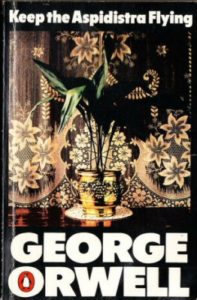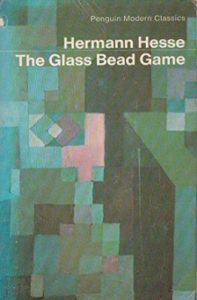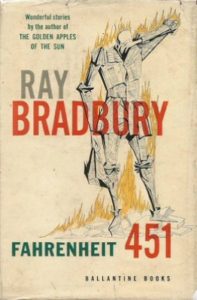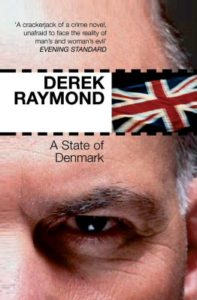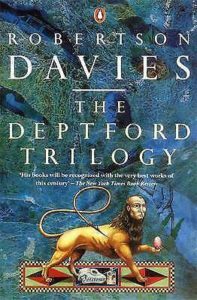Decades – Compiling the Ultimate Library with Simon Bewick
A new week and a new Decades guest with five new books to add to the Decades Library. If you are new to my weekly challenge then let me explain what’s about to happen. I have asked Simon Bewick to nominate five books which he would want to see included within my Ultimate Library.
The Ultimate Library is a concept I started back in January and I had zero books on the virtual shelves. I wanted to assemble the very best collection of books and knew I could not fill a Library on my own so I decided to invite a new guest to join me each week and have them add five books to the collection.
But choosing five books is a little too easy so I add a second rule which my guests need to follow:
1 – Choose ANY five books
2 – You may only select one book per decade over five consecutive decades.
This week we start in the 1960s and progress to the 00’s.
I have been a bit lax of late in updating and promoting the actual Library but now I am all caught up. I try to add each recommendation to the Grab This Book Decades Library at Bookshop.Org – you can view all the previous selections, see who nominated the book for inclusion and even buy the books you fancy. Sadly there are a couple of gaps where books are no longer in print.
Here is a handy link: https://uk.bookshop.org/shop/GrabThisBookDecades
Now that I have covered why we are here, the rules of selection and how to find out more about previous Decades recommendations I can hand over to my guest curator, Simon Bewick.
Simon Bewick has had short stories published in the UK and US and is represented by A for Author agency, who have his first novel out on submission… He’s also half of Virtual Noir at the Bar and Bay Tales with Vic Watson. Through their shows and website (www.baytales.com) they have hosted more than 300 crime and mystery authors to date and will be hosting their first physical one-day crime festival in Whitley Bay on February 12th 2022. Visit the Bay Tales site for more details. You can follow him on Twitter @simonbewick
DECADES
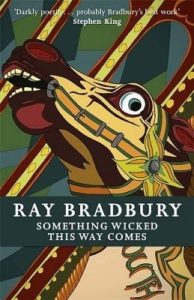 60s – Something Wicked This Way Comes – Ray Bradbury
60s – Something Wicked This Way Comes – Ray Bradbury
Growing up I loved Ray Bradbury’s work – his short stories in collections bought second hand from Blyth market on a Saturday. The stories were different from the Pan Book of Horror shorts I’d read. They weren’t ‘graphic’. They weren’t ‘scary’ and, they didn’t always necessarily seem to have ‘an end’. A teacher in my English class used the term ‘purple prose’ but I knew even as a fourteen year old he was wrong. Bradbury didn’t write in an overly ornate or elaborate way, he just wrote beautifully. I preferred his short stories to his novels for the most part – and Something Wicked This Way Comes was one of the few non ‘fix-up’ novels Bradbury wrote. Do I prefer Dandelion Wine? Maybe…but Something Wicked is a fine pairing with it and probably the one that I’ve gone back to most often. The film version of the book was disappointing, but the poster for it and which hangs in my writing room, sums up the story perfectly in its’ Halloween feel. As the book starts:
First of all, it was October, a rare month for boys.
Ah – I think I copied Bradbury’s openings more than any other author as a teenager. (and that dumb old English teacher never event knew…)
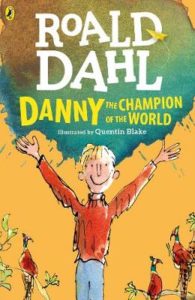 70s – Danny, Champion of the World – Roald Dahl
70s – Danny, Champion of the World – Roald Dahl
I’m not sure how soon after publication I read DCotW, but I’m guessing if it was published in 1975 maybe two years? That would make me around 8 and seems about right. I know I read it a lot of times in the following years. I’m guessing it seemed a somewhat bygone tale on publication: but I loved the descriptive writing (has anyone written such a description of a pie? I haven’t read it if they have). I loved all of Dahl’s books back then (other than The Great Glass Elevator, which started a long history of disappointment in sequels…), but Danny despite, or perhaps because of, being the least fantastical of his children’s fiction if the one that stayed with me and was re-read again and again.
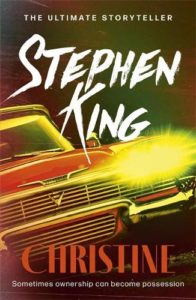 80s – Christine – Stephen King
80s – Christine – Stephen King
Christine may not be the first choice of many people as Stephen King’s best piece of work but for me it sums up everything I love about his writing. It’s about a haunted car: a ’58 Plymouth Fury to be precise– but that, in some ways, is the least interesting part of the book for me (good though it is). What it’s really about, and what it felt as if it was really about when I read it as a fifteen year old back in the day, is about friendship, growing up and growing apart. Dennis Guilder and Arnie Cunningham’s relationship felt so real to me. Dennis’ voice, which much of the book is told from, struck me as so authentic. The trials of school and being ‘different’. Even though I wasn’t a high school jock or a complete social outcast, that I didn’t live in a US suburb, that my first car was a Mark II Escort rather than an American classic…it seemed real. I remember going (underage) to the cinema to see the movie version: my first certificate 18 movie. I loved John Carpenter who directed it and the effects were spot on, but it summed up why so many of the adaptations of King’s work don’t work for me. The movie was about the car. The book was about the characters.
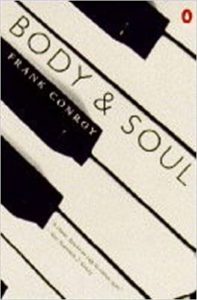 90s – Body and Soul – Frank Conroy.
90s – Body and Soul – Frank Conroy.
Conroy didn’t write too many books in his lifetime. A memoir Stop-Time in 1967); a collection of short stories – Midair in 1985 and only one novel as far as I know of: 1993’s Body and Soul. It’s a book that is criminally hard to get, which is a true shame. I was given my copy by the manager of a café I used to sit and read in who said she thought I might like it. Since then, I’ve loaned it to a few close friends I’m sure I’ll get it back from and I think it’s one of the greatest books written about music and, particularly, about being a musician. If Christine isn’t just about a car, this isn’t just about being a musical prodigy. What it is, is a beautifully written story of chance, coincidence, talent and a life and the characters encountered along the way.
 00s – The Bottoms – Joe R Lansdale.
00s – The Bottoms – Joe R Lansdale.
I was a big fan of Joe R Lansdale by the time The Bottoms came out in 2000. His Hap and Leonard novels had become firm favourites of mine since Savage Season had come out. I loved the dialogue – outrageous and hilarious. I devoured his short stories ranging from horror to mystery to sci fi to who-knows-how-to-describe? (Bob the Dinosaur Goes to Disneyland springs to mind). But The Bottoms is a very different sort of novel. It’s a book about family, racism, small town mind set and good and bad people and those in between. Set during the Great Depression in East Texas the story concerns Harry Crane, a young boy who finds the body of a black woman and the unfolding mystery amid mounting violence and This story takes place during the Great Depression in East Texas. Young Harry Crane discovers the mutilated body of a black woman – a murder he and his younger sister, Thomasina, believe is the work of local urban legend The Goat Man. As they investigate further and the killings continue, racial tensions rise around them, and their childhoods will be forever changed. The book has drawn comparisons to To Kill a Mockingbird, and while it’s easy to see why on a surface level, Lansdale is very much his own writer and has his own unique style. No matter what genre he writes in (and he writes in a lot), his voice is unmistakable. I’ve recommended The Bottoms to more people than any other book I’ve read. I haven’t had any people tell me they were disappointed. That’s got to be a good sign, right?
My thanks to Simon for these brilliant choices. Another Stephen King book warms my heart, particularly as it is one of the first I read and remains a firm favourite. I am also delighted to see Danny Champion of the World, a childhood favourite in my house too.
DECADES WILL RETURN


